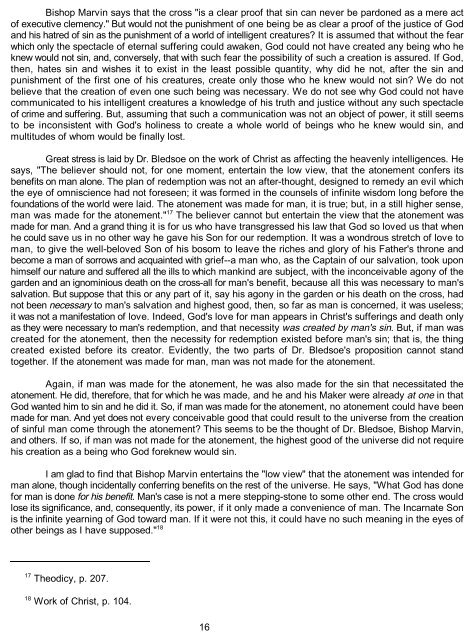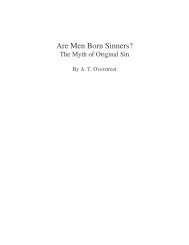Foreknowledge by Joel Hayes - Library of Theology
Foreknowledge by Joel Hayes - Library of Theology
Foreknowledge by Joel Hayes - Library of Theology
Create successful ePaper yourself
Turn your PDF publications into a flip-book with our unique Google optimized e-Paper software.
Bishop Marvin says that the cross "is a clear pro<strong>of</strong> that sin can never be pardoned as a mere act<br />
<strong>of</strong> executive clemency." But would not the punishment <strong>of</strong> one being be as clear a pro<strong>of</strong> <strong>of</strong> the justice <strong>of</strong> God<br />
and his hatred <strong>of</strong> sin as the punishment <strong>of</strong> a world <strong>of</strong> intelligent creatures? It is assumed that without the fear<br />
which only the spectacle <strong>of</strong> eternal suffering could awaken, God could not have created any being who he<br />
knew would not sin, and, conversely, that with such fear the possibility <strong>of</strong> such a creation is assured. If God,<br />
then, hates sin and wishes it to exist in the least possible quantity, why did he not, after the sin and<br />
punishment <strong>of</strong> the first one <strong>of</strong> his creatures, create only those who he knew would not sin? We do not<br />
believe that the creation <strong>of</strong> even one such being was necessary. We do not see why God could not have<br />
communicated to his intelligent creatures a knowledge <strong>of</strong> his truth and justice without any such spectacle<br />
<strong>of</strong> crime and suffering. But, assuming that such a communication was not an object <strong>of</strong> power, it still seems<br />
to be inconsistent with God's holiness to create a whole world <strong>of</strong> beings who he knew would sin, and<br />
multitudes <strong>of</strong> whom would be finally lost.<br />
Great stress is laid <strong>by</strong> Dr. Bledsoe on the work <strong>of</strong> Christ as affecting the heavenly intelligences. He<br />
says, "The believer should not, for one moment, entertain the low view, that the atonement confers its<br />
benefits on man alone. The plan <strong>of</strong> redemption was not an after-thought, designed to remedy an evil which<br />
the eye <strong>of</strong> omniscience had not foreseen; it was formed in the counsels <strong>of</strong> infinite wisdom long before the<br />
foundations <strong>of</strong> the world were laid. The atonement was made for man, it is true; but, in a still higher sense,<br />
17<br />
man was made for the atonement." The believer cannot but entertain the view that the atonement was<br />
made for man. And a grand thing it is for us who have transgressed his law that God so loved us that when<br />
he could save us in no other way he gave his Son for our redemption. It was a wondrous stretch <strong>of</strong> love to<br />
man, to give the well-beloved Son <strong>of</strong> his bosom to leave the riches and glory <strong>of</strong> his Father's throne and<br />
become a man <strong>of</strong> sorrows and acquainted with grief--a man who, as the Captain <strong>of</strong> our salvation, took upon<br />
himself our nature and suffered all the ills to which mankind are subject, with the inconceivable agony <strong>of</strong> the<br />
garden and an ignominious death on the cross-all for man's benefit, because all this was necessary to man's<br />
salvation. But suppose that this or any part <strong>of</strong> it, say his agony in the garden or his death on the cross, had<br />
not been necessary to man's salvation and highest good, then, so far as man is concerned, it was useless;<br />
it was not a manifestation <strong>of</strong> love. Indeed, God's love for man appears in Christ's sufferings and death only<br />
as they were necessary to man's redemption, and that necessity was created <strong>by</strong> man's sin. But, if man was<br />
created for the atonement, then the necessity for redemption existed before man's sin; that is, the thing<br />
created existed before its creator. Evidently, the two parts <strong>of</strong> Dr. Bledsoe's proposition cannot stand<br />
together. If the atonement was made for man, man was not made for the atonement.<br />
Again, if man was made for the atonement, he was also made for the sin that necessitated the<br />
atonement. He did, therefore, that for which he was made, and he and his Maker were already at one in that<br />
God wanted him to sin and he did it. So, if man was made for the atonement, no atonement could have been<br />
made for man. And yet does not every conceivable good that could result to the universe from the creation<br />
<strong>of</strong> sinful man come through the atonement? This seems to be the thought <strong>of</strong> Dr. Bledsoe, Bishop Marvin,<br />
and others. If so, if man was not made for the atonement, the highest good <strong>of</strong> the universe did not require<br />
his creation as a being who God foreknew would sin.<br />
I am glad to find that Bishop Marvin entertains the "low view" that the atonement was intended for<br />
man alone, though incidentally conferring benefits on the rest <strong>of</strong> the universe. He says, "What God has done<br />
for man is done for his benefit. Man's case is not a mere stepping-stone to some other end. The cross would<br />
lose its significance, and, consequently, its power, if it only made a convenience <strong>of</strong> man. The Incarnate Son<br />
is the infinite yearning <strong>of</strong> God toward man. If it were not this, it could have no such meaning in the eyes <strong>of</strong><br />
other beings as I have supposed." 18<br />
17<br />
Theodicy, p. 207.<br />
18<br />
Work <strong>of</strong> Christ, p. 104.<br />
16






